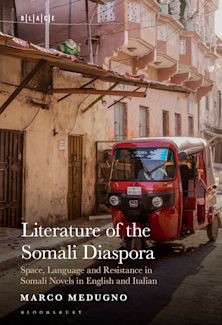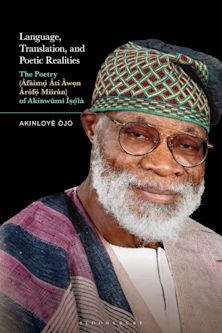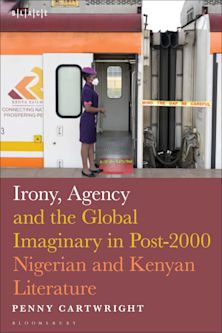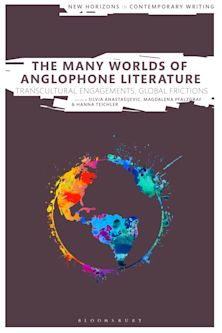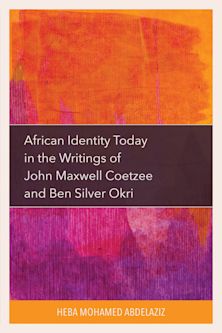- Home
- ACADEMIC
- Literary Studies
- African Literature
- African Modernity and the Philosophy of Culture in the Works of Femi Euba
African Modernity and the Philosophy of Culture in the Works of Femi Euba
African Modernity and the Philosophy of Culture in the Works of Femi Euba
This product is usually dispatched within 1 week
- Delivery and returns info
-
Free US delivery on orders $35 or over
You must sign in to add this item to your wishlist. Please sign in or create an account
Description
This book is a significant and original contribution to the ongoing conversation on modernity. It uses the creative and critical works of Nigerian playwright and novelist Femi Euba to demonstrate the place and function of African cultures in modernity and makes the case for the vibrancy of such cultures in the shaping and constitution of the modern world. In addition to a critique of Euba’s fifty-year artistic career, this book offers an account of Euba’s formative relationship with the 1986 Nobel Prize for Literature winner Wole Soyinka, during the promising days of the Nigerian theatre in the immediate post-independence period, and the effect of this relationship on Euba’s artistic choices and reflections. Euba contributes to our understanding of Africa’s negotiation of modernity in significant ways, especially in his sensitive reading of Esu, the Yoruba god of fate and chance, as an artistic consciousness whose historical and ideological mobility during New World slavery, during Africa’s colonial period, and in the manifestations in the black diaspora today emblematizes the process we call modernity. By using ritual, myth, and satire as avenues to the debate on modernity, Euba lays emphasis on the transformative possibilities at the crossroads of history. His works engage the psychological interconnections between old gods and new worlds and the dialogic relationship between tradition and modernity. Delineating the philosophical and literary debates that reject an easy division between a stereotypically traditional Africa and a modern West, the author shows how Euba’s plays and novel engage the entwined and intimate relationships between the modern and the traditional in contemporary Africa, and thereby she asserts the global resonance of Euba’s African, and specifically Yoruba, conception of the world. By meticulously collecting, cataloguing, and critiquing Euba’s works, Osagie models a new way of practicing African literary studies and invites us to glimpse narrative genius on the continent that she firmly believes African scholars should both promote and celebrate.
Table of Contents
Preface
Chapter 1: Archetypes of Modernity
Chapter 2: Tradition, Modernity, and the Axiological Present in The Gulf and The Eye of Gabriel
Chapter 3: Black Theatre and the Politics of Adaptation in Dionysus of the Holocaust
Chapter 4: Who Pulled the Trigger? Ritual Endings in Femi Euba’s A Riddle of the Palms, Crocodiles, and The Chameleon
Chapter 5: Esu as Shape Shifting Word: Modernity, African Gnosis, and Global Reverberations in Camwood at Crossroads
Afterword: The Performance of Culture
Bibliography
Product details
| Published | Jun 05 2017 |
|---|---|
| Format | Hardback |
| Edition | 1st |
| Extent | 188 |
| ISBN | 9781498545662 |
| Imprint | Lexington Books |
| Illustrations | 2 b/w photos |
| Dimensions | 9 x 6 inches |
| Series | Black Diasporic Worlds: Origins and Evolutions from New World Slaving |
| Publisher | Bloomsbury Publishing |
About the contributors
Reviews
-
With her latest book, African Modernity and the Philosophy of Culture in the Works of Femi Euba, Iyunolu Osagie achieves two critical goals: she delivers an intricate study of the corpus of Euba’s works and at the same time she offers an important perspective on the discourse of tradition and modernity from the prism of African metaphysics. . . . In all, African Modernity and the Philosophy of Culture in the Works of Femi Euba is a thorough exposition into not only the works, but also the artistic career of Femi Euba. Osagie’s personal relationship with Euba brings the book alive in a certain way—the book is peppered with various anecdotes that offer peculiar insight into the ideas and events that inform Euba’s dramaturgy and scholarship, as well as the critical arguments Osagie makes about his works. This book is, without doubt, a valuable addition to the scholarship on Yoruba cosmology, transnational and diasporic African identity, globalization, and modernity. The book will also serve as a useful resource to those who are studying, teaching, or researching Femi Euba and his works.
Research in African Literatures
-
Few have meant more to the flowering of African and African American theater over the past half-century than the Nigerian actor, playwright, director, and scholar, Femi Euba. Now, thanks to Iyunolu Osagie’s brilliant study, we at last have an interpretive companion to Euba’s life and work that will make it possible not only to teach him within the context of his times, but to gain a deeper appreciation for what his art has revealed about the crossroads of tradition and modernity and the possibilities that exist for a dynamic past within a diasporic world. I have known Femi Euba since my days as a graduate student in Cambridge under the tutelage of our mentor Wole Soyinka, and I could not be more thrilled that his genius—for signification, satire, and so much more—is finally receiving the serious treatment it deserves.
Henry Louis Gates Jr., Harvard University
-
African Modernity and the Philosophy of Culture in the Works of Femi Euba by Iyunolu Osagie deftly navigates the intellectual and cultural terrains that create the context for Femi Euba’s work. Her brilliant assessment of Euba’s formative role as a pioneer of Black Atlantic drama and criticism deepens our knowledge of the transnational ritual, social, and artistic entanglements situated in the African diaspora. The study also significantly adds to the body of work on the trickster deity Esu in its innovative, satiric, and wise analysis of this figure as a guide and muse.
Solimar Otero, Louisiana State University












